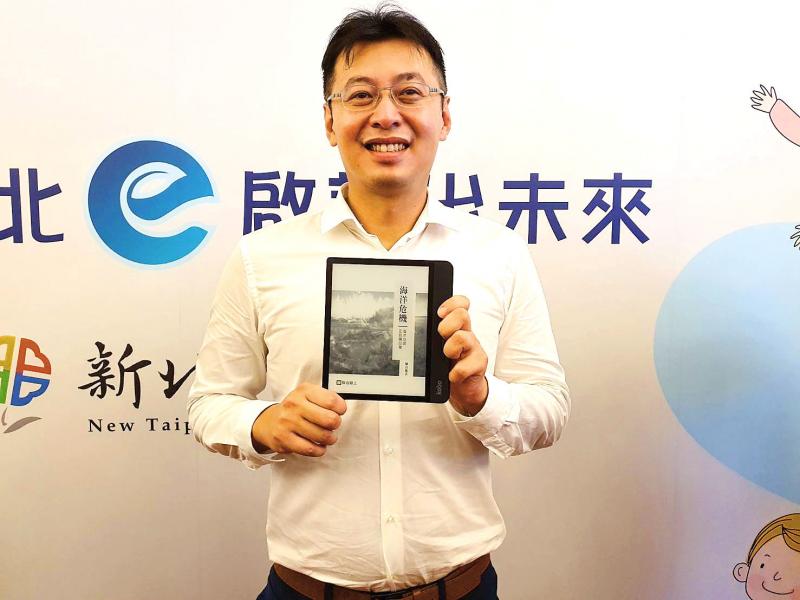E Ink Holdings Inc (元太科技), the world’s sole supplier of e-paper displays, yesterday said that it expects revenue to rise mildly this quarter from last quarter — bucking a downturn in the electronics industry — as the COVID-19 pandemic continues to drive demand for e-readers, e-notes and electronic shelf labels (ESL).
E Ink’s revenue for last quarter surged 22 percent to NT$4.45 billion (US$154.42 million) from NT$3.66 billion in the same period last year.
“The fourth quarter looks strong. That is primarily because of strong demand for e-paper displays, used e-readers and ESL, as well as new applications like e-notes and signs,” E Ink chairman Johnson Lee (李政昊) told investors in an online conference.

Photo: Chiu Shu-yu, Taipei Times
Demand for ESL has surpassed the company’s expectations this year, Lee said.
The Hsinchu-based company said that the estimated revenue growth would also be fueled by demand for e-readers with color displays or bigger screens, such as 10-inch models, or models equipped with a stylus.
Retailers in Portugal and India are joining their global peers in adopting ESL to boost operational efficiency and cope with labor shortages amid pandemic-driven lockdowns, E Ink said.
The global ESL penetration rate is 5 percent, indicating an ample room for growth, it said.
Visibility for the first half of next year is good, Lee said.
The firm said that it is “relatively bullish” about demand for next year and beyond.
To cope with strong demand, E Ink is accelerating capacity expansion and next year plans to invest NT$800 million to NT$1 billion in new manufacturing equipment in Hsinchu and Boston.
Capital expenditure this year might rise to NT$1 billion, higher than NT$600 million to NT$800 million over the past few years, it said.
In the July-to-September quarter, net profit shrank 28 percent to NT$824 million from NT$1.15 billion a year earlier, mostly due to an unrealized asset impairment loss of NT$100 million amid volatile foreign exchange rates, it said.
Operating income soared 190 percent to NT$822 million from NT$284 million a year earlier, the highest in nine years, it said.
The company reported gross margin of 48.2 percent for last quarter, a record.
E Ink financial executive Lloyd Chen (陳樂群) attributed the results to the effects of remote working and online learning amid the pandemic.
In the first three quarters, net profit expanded 5 percent to NT$2.59 billion, compared with NT$2.47 billion in the same period last year, or a rise on earnings per share to NT$2.28 from NT$2.18.

Taiwan’s rapidly aging population is fueling a sharp increase in homes occupied solely by elderly people, a trend that is reshaping the nation’s housing market and social fabric, real-estate brokers said yesterday. About 850,000 residences were occupied by elderly people in the first quarter, including 655,000 that housed only one resident, the Ministry of the Interior said. The figures have nearly doubled from a decade earlier, Great Home Realty Co (大家房屋) said, as people aged 65 and older now make up 20.8 percent of the population. “The so-called silver tsunami represents more than just a demographic shift — it could fundamentally redefine the

The US government on Wednesday sanctioned more than two dozen companies in China, Turkey and the United Arab Emirates, including offshoots of a US chip firm, accusing the businesses of providing illicit support to Iran’s military or proxies. The US Department of Commerce included two subsidiaries of US-based chip distributor Arrow Electronics Inc (艾睿電子) on its so-called entity list published on the federal register for facilitating purchases by Iran’s proxies of US tech. Arrow spokesman John Hourigan said that the subsidiaries have been operating in full compliance with US export control regulations and his company is discussing with the US Bureau of

Businesses across the global semiconductor supply chain are bracing themselves for disruptions from an escalating trade war, after China imposed curbs on rare earth mineral exports and the US responded with additional tariffs and restrictions on software sales to the Asian nation. China’s restrictions, the most targeted move yet to limit supplies of rare earth materials, represent the first major attempt by Beijing to exercise long-arm jurisdiction over foreign companies to target the semiconductor industry, threatening to stall the chips powering the artificial intelligence (AI) boom. They prompted US President Donald Trump on Friday to announce that he would impose an additional

China Airlines Ltd (CAL, 中華航空) said it expects peak season effects in the fourth quarter to continue to boost demand for passenger flights and cargo services, after reporting its second-highest-ever September sales on Monday. The carrier said it posted NT$15.88 billion (US$517 million) in consolidated sales last month, trailing only September last year’s NT$16.01 billion. Last month, CAL generated NT$8.77 billion from its passenger flights and NT$5.37 billion from cargo services, it said. In the first nine months of this year, the carrier posted NT$154.93 billion in cumulative sales, up 2.62 percent from a year earlier, marking the second-highest level for the January-September